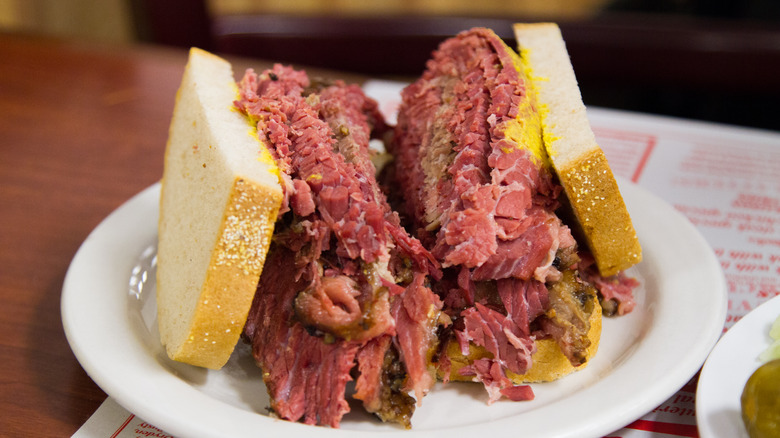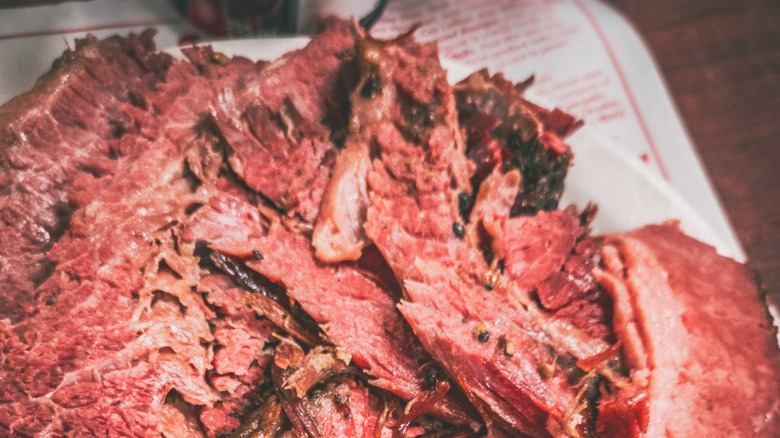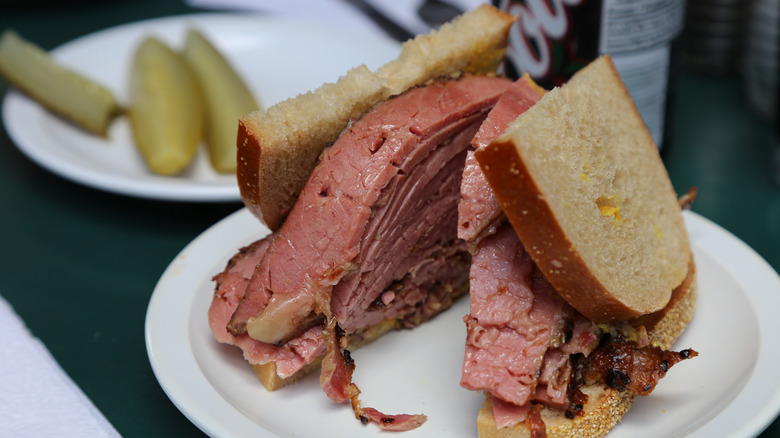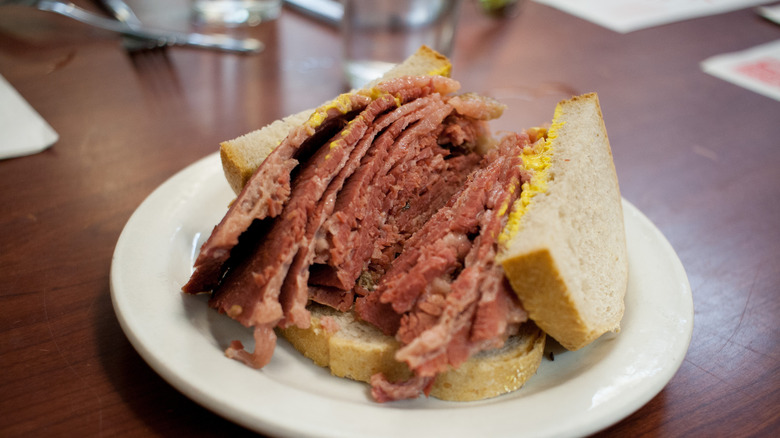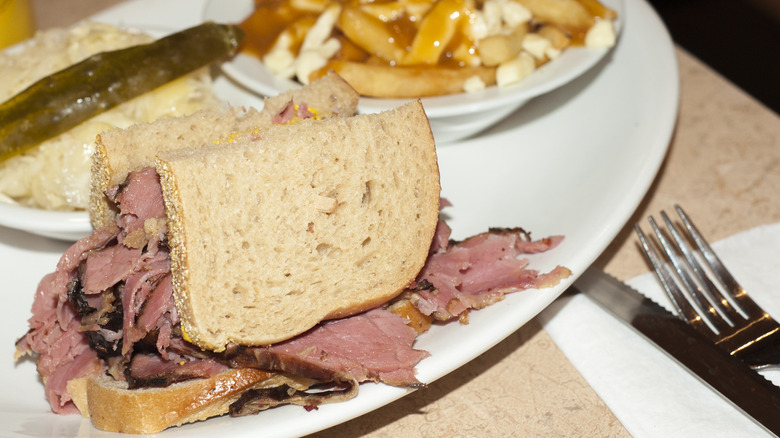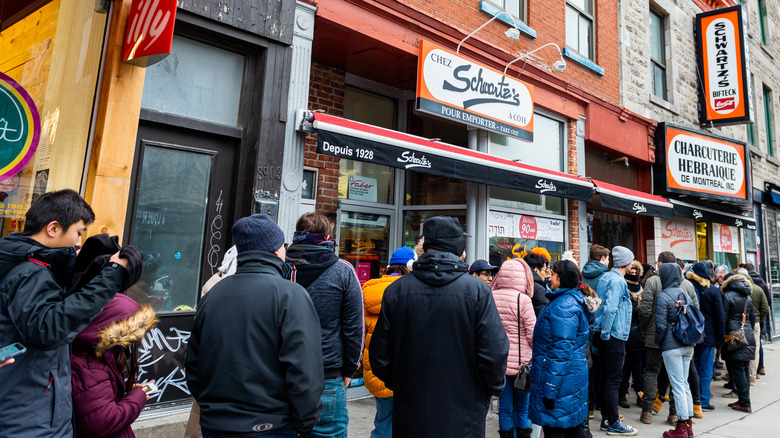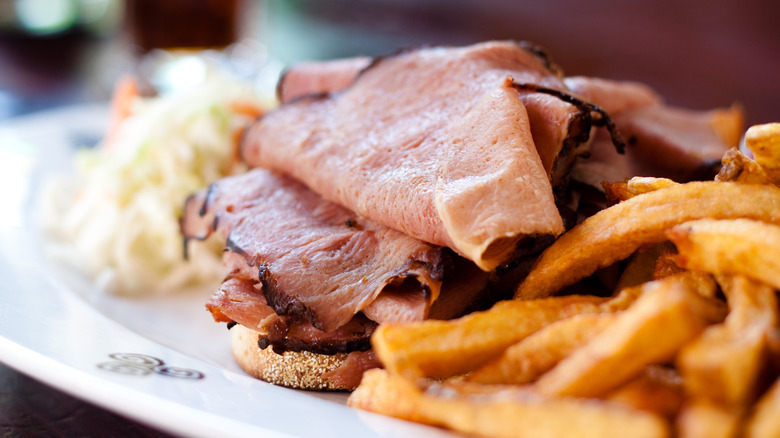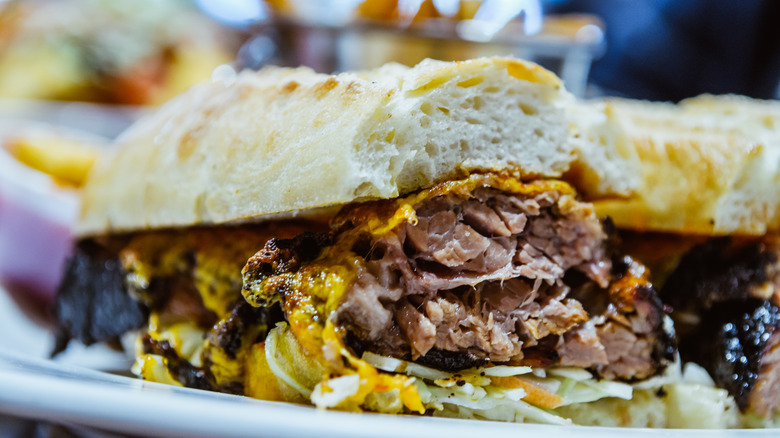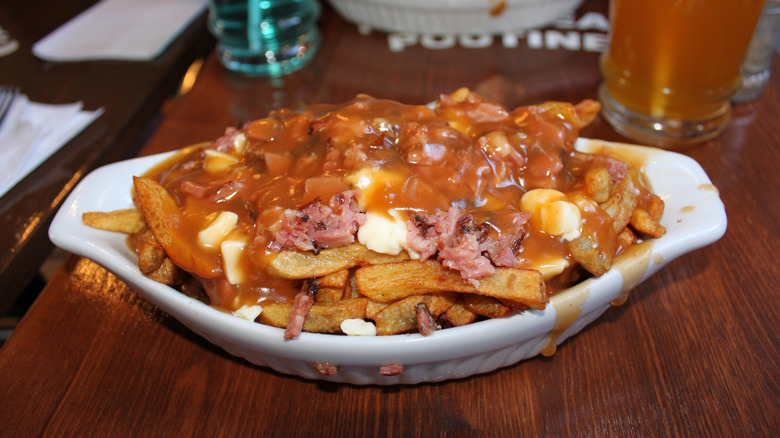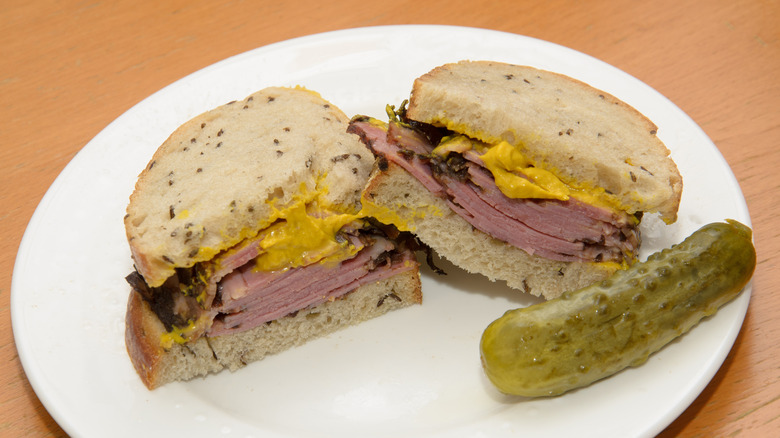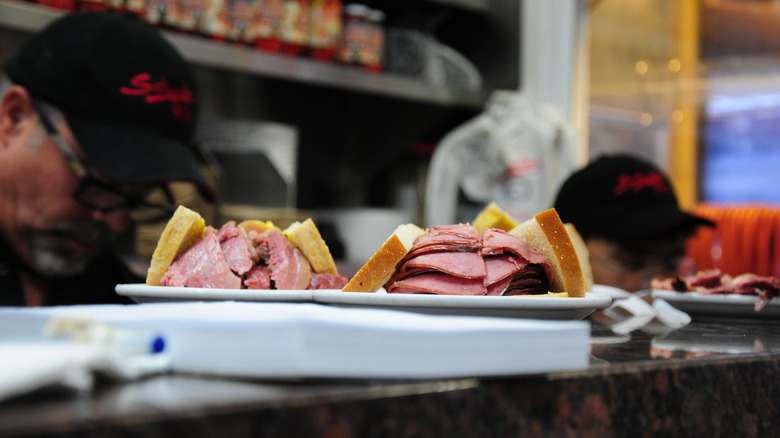The Untold Truth Of Montreal Smoked Meat
Serious food lovers know that Montreal has a well-earned reputation for its hearty, rib-sticking local specialties, including poutine (fries topped with gravy and cheese curds) and bagels (by tradition, Montreal bagels are different than New York bagels, think: smaller, slimmer, and a bit sweeter). But for many, no trip to Montreal would be complete without a big helping of Montreal smoked meat. Sometimes described as a local version of pastrami, Montreal smoked meat was introduced by Jewish immigrants from Eastern Europe in the late 19th and early 20th centuries (via the Canadian Encyclopedia). While the earliest versions were produced in and sold from kosher butcher shops, the richly spiced version diners know today is more often associated with busy delis, where diners are known to wait in long lines in subzero temperatures to get their fix.
Today, Montreal-style smoked meat is popular all across Canada, with some restaurants in other locales even bragging about having their meat shipped directly from Montreal. It's also a huge point of pride for Montreal natives, who love bragging about all the ways their smoked meat is superior to pastrami. But taste is subjective — so the only way to find out if they're right is to try some yourself.
Making Montreal smoked meat takes time and patience
Like many traditional food specialties, Montreal smoked meat made the right way is a labor of love, and its preparation requires planning, time, and skill. According to Eiran Harris, archivist emeritus of the Jewish Public Library in Montreal, by tradition, the meat was first dry-cured in an often-proprietary mixture of salt and spices for between 12 and 20 days. While curing, the meat was traditionally stored in wooden barrels, where it marinated in its own juices. After the curing process, the meat was traditionally hung and smoked for between six and nine hours. While the smoking process reduced the volume of the meat by up to 25%, it also concentrated its flavor. During both curing and cooking, however, cooks needed to monitor the progress of the meat closely — the right curing and cooking times varied with the size of the cut, so no two pieces cooked the exact same way.
Harris noted that in recent years, however, some restaurateurs have adopted shortcuts to speed up the process. Many switched to wet brining — immersing the meat in seasoned brine and nitrates — which allowed the meat to be ready for smoking in only four days. (Some varieties, Harris said, are simply wet-brined overnight.) And today, nearly all delis serving smoked meat steam it before serving to tenderize the meat and restore its moisture. This practice, Harris explained, was likely adopted from American delis, which typically steam their pastrami before cutting and serving it.
What's the difference between Montreal meat, pastrami, and corned beef?
Montreal smoked meat is often compared to — or confused with — its close cousins, pastrami and corned beef. All are spiced, cured cuts of beef that make great sandwiches, but there are notable differences among them in flavor, origins, and preparation. While Montreal smoked meat and pastrami were introduced to North America by Jewish immigrants from Eastern Europe (according to STL Jewish Light), corned beef has its roots in 17th-century England, and per Smithsonian Magazine, neighboring Ireland soon became a major producer of the foodstuff.
Because of their similar origins, the profile of Montreal smoked meat and the flavor of pastrami come from parallel preparations; both are traditionally dry-brined in salt and spices, per Globe and Mail, then smoked to get their distinctive flavors. (In contrast, the truth of corned beef is that it's simply cured in seasoned brine and boiled.) However, per MTL Blog, while pastrami is made from the denser, fattier navel of the cow, Montreal smoked meat is made from the more-tender brisket.
According to the Globe and Mail, Montreal meat is soaked after curing to remove excess salt before the smoking process, and it is typically prepared longer than pastrami, giving it a stronger smoke profile. And as MTL Blog notes, the signature flavorings between smoked meat and pastrami differ as well: While pastrami typically contains sugar, Montreal smoked meat never does. In addition, smoked meat recipes tend to incorporate a larger variety of spices.
Montreal smoked meat inspired a musical
In the musical theater tradition, the only acceptable response to an emotionally charged moment is to break into a song (preferably with a full orchestra and chorus backing you up). So it's a testament to Montreal's deep cultural bond to smoked meat that it became not just the subject of a song, but an entire musical.
Per Food Anthropology, the show, "Schwartz: The Musical" (Schwartz's Deli arguably being Montreal's best-known and best-reputed purveyor of traditional smoked meat), ran at Montreal's Centaur Theatre in 2011 to sold-out houses. Written by the comedy team Bowser and Blue (George Bowser and Rick Blue), the musical was inspired by the book Schwartz's Hebrew Delicatessen: The Story by journalist Bill Brownstein, who (per CBC) suggested they turn the book into a musical. "I realized it was crazy enough to work, and it seems like everybody agrees," Blue told CBC. The critical verdict? According to Broadway World, the libretto is laden with groan-worthy food puns and potshots at Montreal's rival city, Toronto — but this may well be just what fans of Schwartz's Deli are craving.
Here's how Montreal smoked meat is traditionally served
Like every iconic food, Montreal smoked meat has accumulated its own culinary customs and conventions — superfans will tell you there's a right way and a wrong way to order and eat it. The traditional way — and probably the best way to get a sense of what it's all about — is to order it in a sandwich. The Canadian Encyclopedia details that a classic smoked-meat sandwich will consist of rye bread slathered with yellow or spiced mustard and piled high with warm, just-sliced smoked meat. (Consistent with smoked meat's Jewish-Canadian origins and the kosher prohibition against mixing meat and dairy in the same meal, cheese is never part of a classic smoked meat sandwich.) Your sandwich will likely come with classic deli sides such as cole slaw, fries, and a dill pickle.
To get the meal that best suits your palate, you should also know that you can choose your own level of richness. Per MTL.org, you can order your meat "lean" (cut from the brisket flat), "medium" (cut from the slightly fattier middle of the brisket), or "old fashioned" (a combination of medium and fatty pieces). Be warned, though, that while the taste is subjective, many aficionados firmly believe one should never order smoked meat lean.
Here's where to get the best Montreal smoked meat
If this deep dive into the history, culture, and enjoyment of Montreal smoked meat has inspired you to plan a trip to the city, your next question will likely be, "Where can I find the best-smoked meat?" And if you ask around, you're almost certain to get a range of answers. But while lists of favorite smoked-meat purveyors may vary, several names consistently appear on most lists.
On just about every list is the venerable Schwartz's Deli. As we've mentioned, the nearly century-old shop is so beloved it even inspired a musical, and according to historian Eiran Harris, it still makes its smoked meat the traditional way, with long dry-brining and smoking periods. A relative newcomer to the smoked-meat scene that has earned a lot of respect is Smoke Meat Pete, whose owner learned his craft from his father, himself the founder of Main Deli, another well-respected (though less-hyped) spot. Other frequently recommended restaurants (per Eater Montreal) include Lester's Deli, a neighborhood favorite for over 70 years, and Snowdon Deli, which offers sandwiches competitive to their New York deli counterparts and at a fraction of the cost.
Montreal smoked meat was one of Canada's first fast foods
Long before McDonald's and Burger King appeared on the scene, working-class Montreal residents had their own go-to option for inexpensive, ready-to-eat lunches: smoked meat sandwiches. According to historian Eiran Harris, the first Montreal establishment to offer smoked meat in ready-to-eat sandwiches (rather than selling it in bulk for takeout) was the British-American Delicatessen Store, which was opened in 1908 by Hyman Rees, who'd formerly owned a deli in Manhattan. He introduced five-cent smoked meat sandwiches, which became so popular that customers lined up down the length of the street to get them.
Other business owners soon followed suit. Benjamin Kravitz, at the suggestion of his wife, introduced smoked meat sandwiches to the small menu at their fruit and ice cream shop to serve workers from nearby factories who wanted more than just ice cream and snacks. (This idea may have been inspired by the British American Delicatessen Store, which was already operating nearby.) But while sandwich sales comprised only a minority of his store's income, Kravitz, who relished self-promotion, would later go on to brag about being the first to introduce the sandwiches to Montreal — a claim that Harris has found to be patently false.
The first owners of a famed smoked-meat eatery were ashamed to be associated with it
Today, Montreal smoked meat is such a point of local pride in Montreal that its purveyors regularly brag about the longevity of their restaurants or the quality of their meat. Thus, it's ironic that two of the earliest owners of what is now arguably Montreal's most famous smoked meat restaurant — Schwartz's Deli — were both somewhat embarrassed by their association with what they considered a low-class business (via Érudit).
Founder Reuben Schwartz, an immigrant from Romania, first opened the restaurant in 1927. But while his smoked meat recipe proved to be a hit, he struggled to stay afloat during the early years of the Great Depression. And like many Canadians at the time, he sensed that local products — even his own smoked meat — were inferior to those in the U.S., so began marketing his deli as a purveyor of imported kosher meats from New York. When this gambit failed, he sold the deli to a friend, classical musician Maurice Zbriger, who proved to be a sharp entrepreneur and quickly turned the struggling business around. But while being the man who saved Schwartz Deli would be a huge bragging right today, Zbriger, protective of his reputation as an elite musician, kept Schwartz on as the deli's front man and refused to be publicly associated with it.
Creative cooks have incorporated Montreal smoked meat into other classic dishes
Montreal smoked meat is known for its tenderness. Per Thrillist, by tradition, it's cut into thinner slices than pastrami, and according to MTL Blog, the fact that it's made from brisket — a looser, less-dense cut than the navel cut from which pastrami is made — lends it a melt-in-the-mouth texture if prepared correctly.
But the prized texture of Montreal smoked meat doesn't just mean it makes great sandwiches. It also means that it generates a lot of crumbly little shreds when sliced. And because these tasty bits are too good to throw away, Montreal cooks have taken to adding them to other iconic Canadian food specialties, creating multiple layers of Canadiana on a single plate. For instance, restaurants such as Dunn's Famous often use smoked meat is often used as a topping for the classic dish poutine, French fries topped with gravy, and cheese curds. Still, others suggest that instead of ordering your smoked meat sandwich on rye, you have it on a Montreal-style bagel. More adventurous cooks have discovered that the flavorful bits can fit it nearly everywhere — the longtime Montreal deli Dunn's, for instance, offers smoked meat on pizza, in egg rolls, and even with fried rice.
Montreal smoked meat is making inroads in New York
Back when smoked meat first started appearing in Montreal's kosher butcher shops, many Canadians had a less-than-healthy sense of national identity: Per Érudit, even purveyors who painstakingly prepared their own smoked meat and other products preferred to tout them as American, believing this denoted higher quality. This probably explains why the first establishment in Montreal to sell smoked-meat sandwiches called itself the British-American Delicatessen Store.
But over time, this started to change. Today, Canadians, and Montreal residents, in particular, are proud to claim smoked meat as their own. And its appeal isn't just limited to Canada — enough tourists have tasted and become enamored with it that, so writes MTL Blog, enterprising restaurateurs have started making and serving it in the U.S. MTL Blog cites as an example Mile End, a smoked-meat eatery that opened in New York City, where its offerings went fearlessly head-to-head against the city's celebrated pastrami and corned beef sandwiches. Per a review in GQ, locals were so eager to try Mile End that the reviewer had to wait three days to get in. And the verdict? GQ's reviewer, an ex-pat Canadian, confirmed it was the real deal — not quite Schwartz's, but a more-than-respectable alternative.
Montreal smoked meat is (arguably) healthier than pastrami
Fans of Montreal smoked meat can give you any number of reasons why smoked meat is superior to pastrami, its better-known close relative. They'll tell anyone willing to listen that it not only tastes better but has a better texture and even a more attractive color. Of course, these are purely subjective judgments — what one person finds perfectly spiced and appetizing to look at could seem over-seasoned and garish to someone else.
But there are a few objectively quantifiable features that give Montreal smoked meat a slight edge nutritionally, making it an (ever so marginally) more healthful food choice than pastrami, per Thrillist. For one, unlike pastrami, Montreal smoked meat does not contain any sugar. Second, it's generally less fatty than brisket. And third, the aggressively peppery seasoning used in some varieties is alleged to help burn fat. However, Thrillist itself suggests all these points somewhat facetiously and admits that no amount of arguing is going to convince anyone that Montreal smoked meat is diet food.
Celine Dion is part owner of a famed Montreal smoked meat restaurant
Look at any list of favorite smoked meat restaurants in Montreal, and chances are Schwartz's Deli will be at or near the top of the list. Founded by a Romanian immigrant in 1928, Schwartz's has undergone several changes of ownership over the years, with founder Reuben Schwartz selling it to his friend, musician Maurice Zbriger, who ran it until his death in 1981, when, per his wishes, his longtime nurse Armand Chartrand took over the operation. Like her late employer, Chartrand had a talent for business and ran Schwartz's until selling it to Hy Diamond, formerly an accountant at the restaurant, in 1999. When Diamond decided to step down in 2012 (because of failing health, according to Chatelaine), he sold Schwartz's to a group of investors that included singer Celine Dion and her late husband, René Angélil.
This turn of events raised eyebrows, as well as serious concerns among longtime Schwartz loyalists. Nobody wanted to see the famously scruffy eatery glitzed up, modernized, or, God forbid, franchised. But they shouldn't have worried. The daughter of a butcher, Dion has enough respect for meat and its preparation to let the smoked-meat specialists at Schwartz's do their jobs without her interference. And while you won't see her behind the counter slicing your meat, she does make an appearance from time to time, occasionally buying sandwiches to donate to local charities.
